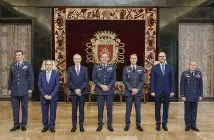
By Andrew Curran
China’s Aerospace Force, now responsible for supervising the country’s military space operations and space launches, has emerged as a senior military arm after an organisational overhaul by Chinese President Xi Jinping last week.
The reorganisation sees the Chinese military comprise four services – the Army, Navy, Air Force, and Rocket Forces, and four arms: the Aerospace Force, the Cyberspace Force, the Information Support Force, and the Joint Logistics Support Force.
The Strategic Support Force (SSF), responsible for overseeing space affairs under its Aerospace Systems Department at the theatre level, was disbanded. The SSF, which oversaw cyber operations, electronic warfare, information and communication technology, and space, was believed to have been overstretched and delivering sub-optimal outcomes.
The stand-alone Aerospace Force may adopt an operating model similar to the US Space Force, which has successfully centralised US space warfare capabilities.
“Space is a shared asset of humanity,” Ministry of National Defense spokesperson Colonel We Qian told journalists last week. “Building the Aerospace Force is of great significance to strengthening the capacity to safely enter, exit and openly use space, enhancing crisis management and the efficacy of comprehensive governance in space and promoting peaceful utilisation of space.”
China has one of the world’s most active space programs. It aims for 100 launches this year, and unlike the trend towards private operators in many other nations, the Chinese government still plays a large role in the country’s space program. Xi reportedly views space as critical to the country’s future offensive and defensive capabilities, as well as the economy.
“We believe that a lot of their so-called civilian space program is a military program,” NASA Administrator Bill Nelson told the House Appropriations Committee on NASA’s budget last week. China has made extraordinary strides, especially in the last ten years.”
“The People’s Republic of China is moving at breathtaking speed in space,” US Space Force Commander General Stephen Whiting told journalists this week. “They are rapidly developing a range of counter-space weapons to hold at risk our space capabilities, but they’re also using space to make their terrestrial forces more precise, more lethal, and more far-ranging.”
Addressing the Chinese military’s organisational changes, Whiting said the US needed to consider what it meant in the long term. “I think there’s a shared understanding of the threats that we now face and the importance of space not only to how we defend our nations, but also to enabling this modern way of life that we’ve become used to. If we didn’t have space capabilities, we would have to change how we live, our ways of life, and change our economies – and that’s something we certainly don’t want to do,” he said.
Acknowledging the strategic importance of space security, Qian says China has a transparent space policy. “We are committed to peaceful utilisation of space,” he said. “We stand ready to work with all countries with the same commitment to strengthen exchanges, deepen cooperation and contribute to lasting peace and common security in space.”





